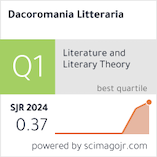Vesna Elez
ARTICULER LES AFFECTS : FUIR DE JEAN-PHILIPPE TOUSSAINT
DOI: https://doi.org/10.33993/dlr.2018.5.45.55
Author's coordinates: Faculty of Philology, University of Belgrade, 3, Studentski trg, Belgrade
Email: vesna.elez@fil.bg.ac.rs
JEAN-PHILIPPE TOUSSAINT’S RUNNING AWAY
(Abstract)
In his novel Running Away (a part of his “Cycle of Marie”, the other three being Making Love, The Truth about Marie and Naked), Jean-Philippe Toussaint offers an unconventional narrative treatment of the affective dynamics. The narrator-protagonist informs the reader that the novel is about his attempted separation from Marie. He leaves to China. The plot comprises several episodes which are not directly linked to the affects, offering a roman noir pattern of sorts. However, the affective canvas is overwhelming: although hardly articulated, the affects inundate the text by their silent presence. We intend to demonstrate that by using the verbs of movement which create distance between each other (leave, run, move, abandon, disappear, etc.) the narrator underlines Marie’s omnipresence, although she actually appears in the last section of the novel. Her absence translated into her presence articulates the paradoxical nature of the affects which cannot be dominated by a rational decision and which defy the very narrative’s linearity. Following Roland Barthes’ arguments in his essay A Lovers’ Discourse: Fragments, we aim to underline the paradoxical narrative strategy which confirms the predominance of the affects using the imagery of emptiness, void and escape.
Keywords: Jean-Philippe Toussaint, Fuir, Roland Barthes, affects, roman noir.
ARMONIZAREA EMOŢIILOR: SĂ FUGI! de JEAN-PHILIPPE TOUSSAINT
(Rezumat)
În romanul Să fugi! (din Ciclul Mariei, care mai cuprinde romanele Să faci dragoste, Adevărul despre Mary şi Camera de baie) Jean-Philippe Toussaint oferă o abordare neconvenţională a dinamicii afectelor. Protagonistul-narator îi mărturiseşte cititorului că romanul este despre încercarea sa de a se despărţi de Marie. De aceea, pleacă în China. Acţiunea cuprinde o serie de episoade care nu sunt direct legate de afecte, prin formula unui roman noir. Cu toate acestea, structura emoţională este precumpănitoare: fie şi vag exprimate, sentimentele inundă textul printr-o prezenţă tăcută. Intenţia noastră este de a demonstra că, folosind verbele de mişcare ce creează distanţa (a pleca, a fugi, a se mişca, a abandona, a dispărea etc.), naratorul subliniază omniprezenţa Mariei, chiar dacă aceasta apare în realitate doar în ultima parte a romanului. Absenţa ei tradusă prin prezenţă relevă natura paradoxală a afectelor, care nu pot fi dominate printr-o decizie raţională, întrerupând însuşi caracterul linear al expunerii. Urmând ideile lui Roland Barthes din eseul Discursul îndrăgostit: Fragmente, dorim să scoatem în evidenţă strategia narativă paradoxală ce confirmă rolul predominant al sentimentelor, prin intermediul unor imagini precum golul, vidul şi evaziunea.
Cuvinte-cheie: Jean-Philippe Toussaint, Fuir, Roland Barthes, afecte, roman noir.


